
Lev Davidovich Bronstein, better known as Leon Trotsky, was a Russian Marxist revolutionary, political theorist and politician. Ideologically a communist, he developed a variant of Marxism which has become known as Trotskyism.

Nikolai Ivanovich Bukharin was a Bolshevik revolutionary, Soviet politician, Marxist philosopher and economist and prolific author on revolutionary theory.

Trotskyism is the political ideology and branch of Marxism developed by Ukrainian-Russian revolutionary Leon Trotsky and by some other members of the Left Opposition and Fourth International. Trotsky self-identified as an orthodox Marxist, a revolutionary Marxist, and Bolshevik–Leninist, a follower of Marx, Engels, and of 3L: Vladimir Lenin, Karl Liebknecht, Rosa Luxemburg. He supported founding a vanguard party of the proletariat, proletarian internationalism, and a dictatorship of the proletariat based on working class self-emancipation and mass democracy. Trotskyists are critical of Stalinism as they oppose Joseph Stalin's theory of socialism in one country in favor of Trotsky's theory of permanent revolution. Trotskyists also criticize the bureaucracy and anti-democratic current that developed in the Soviet Union under Stalin.

The Great Purge or the Great Terror, also known as the Year of '37 and the Yezhovshchina, was Soviet General Secretary Joseph Stalin's campaign to solidify his power over the party and the state; the purges were also designed to remove the remaining influence of Leon Trotsky as well as other prominent political rivals within the party. It occurred from August 1936 to March 1938.
Max Shachtman was an American Marxist theorist. He went from being an associate of Leon Trotsky to a social democrat and mentor of senior assistants to AFL–CIO President George Meany.
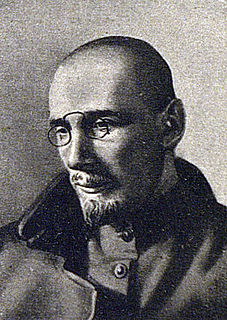
Ivar Tenisovich Smilga was a Bolshevik leader, Soviet politician and economist. He was a member of the Left Opposition in the Soviet Union.

Avel Safronovich Yenukidze was a prominent Georgian "Old Bolshevik" and, at one point, a member of the Central Committee of the All-Union Communist Party (b) in Moscow. In 1932, along with Mikhail Kalinin and Vyacheslav Molotov, Yenukidze co-signed the infamous "Law of Spikelets". In 1918 to 1935 Yenukidze served as the Secretary of the All-Russian Central Executive Committee and the Central Executive Committee of the Soviet Union.
The Leninist League was a communist political party in the United States. It published a newspaper called "In Defense of Bolshevism".
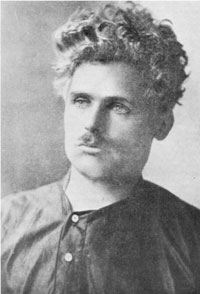
Timofei Vladimirovich Sapronov was a Russian revolutionary, Old Bolshevik and socialist militant who was one of the leaders of the Left Opposition in the Communist Party of the Soviet Union.
David King was a British writer, designer and historian of graphic design who, in the course of his research, assembled one of the largest collections of Soviet graphics and photographs. From this collection, he created a series of revelatory books unfolding the history of the Russian Revolution, and its associated art and propaganda. King developed a special interest in Leon Trotsky and the subsequent doctoring of revolutionary photos and records. Part of King's collection is housed on the fourth floor of Tate Modern, London.

Yevgeni Alekseyevich Preobrazhensky was a Russian revolutionary, Soviet economist and sociologist. A member of the governing Central Committee of the Bolshevik faction and its successor, the All-Union Communist Party, Preobrazhensky is remembered as a leading voice for the rapid industrialisation of peasant Russia through a concentration on state-owned heavy industry.

My Life: An Attempt at an Autobiography is the name of the Russian revolutionary Communist leader Leon Trotsky's autobiography. The book was first published in 1930 and was written in the first year of Trotsky's exile in Turkey. It covers the time from his youth, through the Revolution of 1905, the Revolution of 1917, the Russian Civil War up to his struggle against Stalinism and eventual expulsion from the Communist Party.

Marxism and the National Question is a short work of Marxist theory written by Joseph Stalin in January 1913 while living in Vienna. First published as a pamphlet and frequently reprinted, the essay by the ethnic Georgian Stalin was regarded as a seminal contribution to Marxist analysis of the nature of nationality and helped to establish his reputation as an expert on the topic. Stalin would later become the first People's Commissar of Nationalities following the victory of the Bolshevik Party in the October Revolution of 1917.
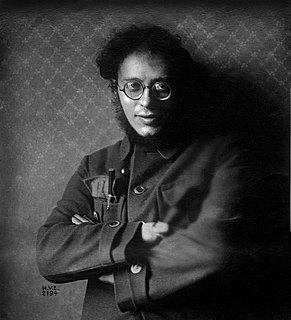
Karl Berngardovich Radek was a Marxist active in the Polish and German social democratic movements before World War I and an international Communist leader in the Soviet Union after the Russian Revolution.
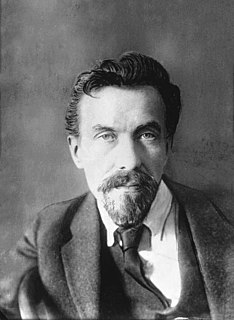
Alexei Ivanovich Rykov was a Russian Bolshevik revolutionary and a Soviet politician and statesman, most prominent as premier of Russia and the Soviet Union from 1924 to 1929 and 1924 to 1930 respectively. He was one of the accused in Joseph Stalin's show trials during the Great Purge.
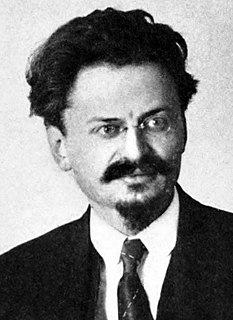
Lessons of October is a polemical essay of about 60 printed pages in length by Leon Trotsky, first published in Moscow in October 1924 as the preface to the third volume of his Collected Works. The essay was harshly critical of the purported revolutionary failings of Grigory Zinoviev and Lev Kamenev, two key members of the collective leadership which briefly ruled Soviet Russia in the months after the death of V. I. Lenin. Publication of the essay was used as a pretext for the Soviet leadership to isolate and attack Trotsky, whom the leadership mutually perceived as a threat to accede to supreme power.
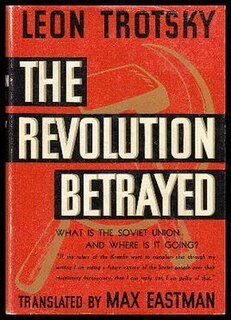
The Revolution Betrayed: What Is the Soviet Union and Where Is It Going? is a book published in 1937 by the exiled Soviet Bolshevik leader Leon Trotsky. This work analyzed and criticized the course of historical development in the Soviet Union following the death of Lenin in 1924 and is regarded as Trotsky's primary work dealing with the nature of Stalinism. The book was written by Trotsky during his exile in Norway and was originally translated into Spanish by Victor Serge. The most widely available English translation is by Max Eastman.
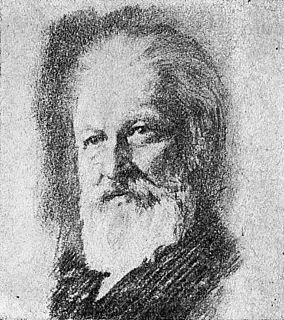
Mikhail Stepanovich Olminsky was a prominent Russian Bolshevik particularly involved with Party history and also an active literary theorist and publicist.

Stalin: An Appraisal of the Man and His Influence is a biography of Joseph Stalin, written by Leon Trotsky between 1938 and 1940. The book was never finished due to Trotsky's assassination in August 1940 although copious draft manuscripts for concluding chapters survived, allowing editors to complete the work.

Below is a list of post World War II scholarly books and journal articles written in or translated into English about communism. Items on this list should be considered a non-exhaustive list of reliable sources related to the theory and practice of communism in its different forms.
















